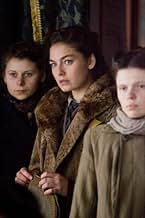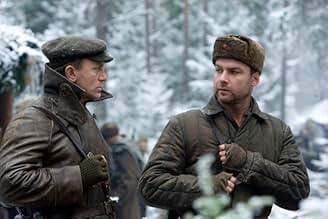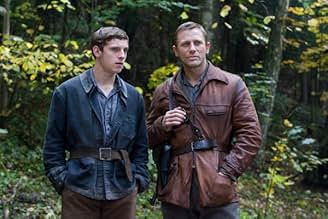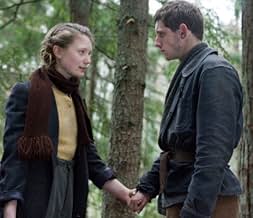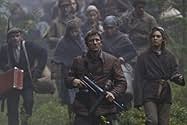Jewish brothers in German-occupied Eastern Europe escape into a Belorussian forest, where they join Russian resistance fighters, and endeavor to build a village, in order to protect themselv... Read allJewish brothers in German-occupied Eastern Europe escape into a Belorussian forest, where they join Russian resistance fighters, and endeavor to build a village, in order to protect themselves and about one thousand Jewish non-combatants.Jewish brothers in German-occupied Eastern Europe escape into a Belorussian forest, where they join Russian resistance fighters, and endeavor to build a village, in order to protect themselves and about one thousand Jewish non-combatants.
- Director
- Writers
- Stars
- Nominated for 1 Oscar
- 2 wins & 5 nominations total
- Director
- Writers
- All cast & crew
- Production, box office & more at IMDbPro
Featured reviews
The movie was good. Not Zwick's best effort though and as for the acting it was Liev Schreiber that delivered the most. Every time I see Craig I see James Bond and that other guy, Jamie Bell, was barely even on screen. I'm guessing most of his scenes were cut out of the film to pave the way for more Craig screen time. The action set pieces were mostly impressive but the problem is, its over before you know it. But I can honestly say, it was impressive nonetheless. Its not brainless by any means, the movie has a profound and compelling story. One can only wonder how these filmmakers come up with more WWII movie ideas every year.
From a visual point of view, the movie looks absolutely beautiful. From the authentic weaponry and uniforms to the rich and colorful Lithuanian locations, Defiance may fall flat during some points throughout the film; as with every other black and white war movies that's been released, the Germans are depicted as war machines of death without remorse, if you can overlook these flaws I think it is an enjoyable film and in its entirety, Defiance is an overwhelming movie that doesn't glamorize the war but shows the intense reality behind it all. A must see for all war movie fans out there.
From a visual point of view, the movie looks absolutely beautiful. From the authentic weaponry and uniforms to the rich and colorful Lithuanian locations, Defiance may fall flat during some points throughout the film; as with every other black and white war movies that's been released, the Germans are depicted as war machines of death without remorse, if you can overlook these flaws I think it is an enjoyable film and in its entirety, Defiance is an overwhelming movie that doesn't glamorize the war but shows the intense reality behind it all. A must see for all war movie fans out there.
I enjoyed "Defiance" immensely -- there was humor and heartache, with a liberal dose of action. Not a brainless action movie, enough of a story to make it memorable, and fast-paced enough to keep me from becoming bored.
On the other hand, although the movie captures the spirit of the story, it is far from a documentary, and I'd have preferred a more historically accurate film. I'm biased, though -- I read the Peter Duffy book "Bielski Brothers" soon after it was released ("Defiance" is based on a different book), and I found the real story even more compelling than the Hollywood version.
Nonetheless, I live in the real world where directors have to shoot on a budget, and this was a good, diverting peek into a story that was long overdue to be told.
On the other hand, although the movie captures the spirit of the story, it is far from a documentary, and I'd have preferred a more historically accurate film. I'm biased, though -- I read the Peter Duffy book "Bielski Brothers" soon after it was released ("Defiance" is based on a different book), and I found the real story even more compelling than the Hollywood version.
Nonetheless, I live in the real world where directors have to shoot on a budget, and this was a good, diverting peek into a story that was long overdue to be told.
This is an interesting film about a bunch of Jews commanded by the Bielski brothers taking the Belorussia forests to shelter themselves from Nazi criminals . It is completely set in the woods which it does some claustrophobic . Splendid acting by all-star-cast . Nicely photographed by Eduardo Serra in colorful palette . Emotive and sensitive musical score by the great composer James Newton Howard. This is a true story , worth telling and stunningly directed in old-style by Edward Zwick .
The picture is inspired on real events based on the novel titled ¨Defiance : The Balski partisans¨ , being well adapted by Clayton Frohman and Edward Zwick . The actual events are the followings : The Bielski group's partisan (three brothers finely performed by Daniel Craig , Liev Schriever , Jamie Bell) activities were aimed to hold the Jewish community together and fight against the Nazis and their collaborators, such as Belarusian volunteer policemen or local inhabitants who had betrayed or killed Jews. They also conducted sabotage missions . The Nazi regime offered a reward for assistance in the capture of Tuvia (Daniel Craig) Bielski, and in 1943, led major clearing operations against all partisan groups in the area. Some of these groups suffered major casualties, but the Bielski partisans fled safely to a more remote part of the forest , and continued to offer protection to the noncombatants among their band . The Bielski group would raid nearby villages and forcibly seize food ; on occasion peasants who refused to share their food with the partisans were the subject of violence and even murder. This caused hostility towards the partisans from peasants in the villages, though some would help the Jewish partisans.The Bielski partisans eventually became affiliated with Soviet organisations in the vicinity of the Naliboki Forest under Russian General (in the movie Panchenko is played by Ravil Isyanov). Several attempts by Soviet partisan commanders to absorb Bielski fighters into their units were resisted, such that the Jewish partisan group retained its integrity and remained under Tuvia Bielski's command. This allowed him to continue in his dedication to protect Jewish lives along with engaging in combat activity, but would also prove a problem later on . The Bielski partisan leaders split the group into two units, one named Ordzhonikidze, led by Zus (Liev Schreiber), and the other Kalinin, commanded by Tuvia (Daniel Craig). According to partisan documentation , Bielski fighters from both units killed a total of 381 enemy fighters , sometimes during joint actions with Soviet groups. 50 members of the group were killed. In the summer of 1944, when the Soviet counteroffensive began in Belarus and the area was taken over by the Soviets, the Kalinin unit , numbering 1,230 men, women and children, emerged from the forest and marched into Nowogrodek.Despite their previous collaboration with the Soviets, relations quickly worsened. The NKVD started interrogating the Bielski brothers about the rumours of loot they had reportedly collected during the war, and about their failure to "implement socialist ideals in the camp". Asael Bielski (Jamie Bell) was conscripted into the Soviet Red Army and fell in the Battle of Königsberg in 1945. The remaining brothers escaped Soviet-controlled lands, emigrating West. After the war, Tuvia Bielski returned to Poland, then emigrated to present-day Israel in 1945. Tuvia and Zus eventually settled in the United States. They operated a successful trucking business. When Tuvia died in 1987, he was buried in Long Island, NY, but a year later, at the urging of surviving partisans in Israel, he was exhumed and given a hero's funeral at the hillside graveyard in Jerusalem. His wife, Lilka (Alexa Davalos), was buried beside him in 2001 . None of the Bielskis ever sought any recognition or reward for their actions.
The picture is inspired on real events based on the novel titled ¨Defiance : The Balski partisans¨ , being well adapted by Clayton Frohman and Edward Zwick . The actual events are the followings : The Bielski group's partisan (three brothers finely performed by Daniel Craig , Liev Schriever , Jamie Bell) activities were aimed to hold the Jewish community together and fight against the Nazis and their collaborators, such as Belarusian volunteer policemen or local inhabitants who had betrayed or killed Jews. They also conducted sabotage missions . The Nazi regime offered a reward for assistance in the capture of Tuvia (Daniel Craig) Bielski, and in 1943, led major clearing operations against all partisan groups in the area. Some of these groups suffered major casualties, but the Bielski partisans fled safely to a more remote part of the forest , and continued to offer protection to the noncombatants among their band . The Bielski group would raid nearby villages and forcibly seize food ; on occasion peasants who refused to share their food with the partisans were the subject of violence and even murder. This caused hostility towards the partisans from peasants in the villages, though some would help the Jewish partisans.The Bielski partisans eventually became affiliated with Soviet organisations in the vicinity of the Naliboki Forest under Russian General (in the movie Panchenko is played by Ravil Isyanov). Several attempts by Soviet partisan commanders to absorb Bielski fighters into their units were resisted, such that the Jewish partisan group retained its integrity and remained under Tuvia Bielski's command. This allowed him to continue in his dedication to protect Jewish lives along with engaging in combat activity, but would also prove a problem later on . The Bielski partisan leaders split the group into two units, one named Ordzhonikidze, led by Zus (Liev Schreiber), and the other Kalinin, commanded by Tuvia (Daniel Craig). According to partisan documentation , Bielski fighters from both units killed a total of 381 enemy fighters , sometimes during joint actions with Soviet groups. 50 members of the group were killed. In the summer of 1944, when the Soviet counteroffensive began in Belarus and the area was taken over by the Soviets, the Kalinin unit , numbering 1,230 men, women and children, emerged from the forest and marched into Nowogrodek.Despite their previous collaboration with the Soviets, relations quickly worsened. The NKVD started interrogating the Bielski brothers about the rumours of loot they had reportedly collected during the war, and about their failure to "implement socialist ideals in the camp". Asael Bielski (Jamie Bell) was conscripted into the Soviet Red Army and fell in the Battle of Königsberg in 1945. The remaining brothers escaped Soviet-controlled lands, emigrating West. After the war, Tuvia Bielski returned to Poland, then emigrated to present-day Israel in 1945. Tuvia and Zus eventually settled in the United States. They operated a successful trucking business. When Tuvia died in 1987, he was buried in Long Island, NY, but a year later, at the urging of surviving partisans in Israel, he was exhumed and given a hero's funeral at the hillside graveyard in Jerusalem. His wife, Lilka (Alexa Davalos), was buried beside him in 2001 . None of the Bielskis ever sought any recognition or reward for their actions.
Plot: A trio of brothers in Nazi-occupied Belorussia hide in the woods to try and save their fellow Jews whilst fighting the Nazis.
Since the Second World War there has always been a certain amount of controversy amongst Jews over the near-total lack of resistance by the Jews to the Holocaust. Many great writers, amongst whom I particularly recommend Vassily Grossman, have tried to work out why the Jews (mostly) didn't fight back. Now comes DEFIANCE which tries to give us heroic Jewish partisans who protect their people and strike out at the Nazis whilst making the sort of speeches about freedom that American films inevitably make, regardless of period or suitability.
Unfortunately the film is a lie, which rather undermines its message. In reality the brothers collaborated with the Soviets during the joint Soviet-Nazi invasion of Poland. Understandably their neighbours loathed them for this so when the Nazis came the Bielskis were attacked and driven into the forest. There they set up a camp which gradually attracted more and more refugee Jews. Far from fighting the Nazis and attacking tanks, as the film depicts, they spent most of the war trying to survive. Which meant banditry as they attacked and robbed local villages. Not only that but they joined up with the Soviets again - one of the brothers might even have entered into the NKVD - and betrayed Polish nationalist (anti-Nazi, anti-Soviet) partisans. They even massacred a whole village of Poles on one occasion, even killing the women and children. So, not exactly the heroic freedom fighters the film depicts.
Of course the film is also terribly made so that doesn't matter too much. Whilst the script is mere fiction the direction is terrible. Moments that ought to be shocking, such as the discovery of a mass grave, are completely lacking in horror or sensitivity. The usual clichés - white horses, re-enactors with overly-clean uniforms, an ambush threatened when the enemy stop and one of them begins to urinate on the exact bush a partisan is hiding behind - are ticked off one by one. Despite costing several tens of millions of dollars the whole thing looks cheap. The film never achieves the horror, the immediacy or the reality of the partisan lifestyle. Nor is there any feeling of what eking out survival in the forest is really like. It doesn't exactly help either that two of the three leads, Daniel Craig and Jamie Bell, both look more like Nazis than the bad guys. The whole thing carries on in a wholly predictable manner to its obvious and unsatisfying conclusion. Watch COME AND SEE instead.
Since the Second World War there has always been a certain amount of controversy amongst Jews over the near-total lack of resistance by the Jews to the Holocaust. Many great writers, amongst whom I particularly recommend Vassily Grossman, have tried to work out why the Jews (mostly) didn't fight back. Now comes DEFIANCE which tries to give us heroic Jewish partisans who protect their people and strike out at the Nazis whilst making the sort of speeches about freedom that American films inevitably make, regardless of period or suitability.
Unfortunately the film is a lie, which rather undermines its message. In reality the brothers collaborated with the Soviets during the joint Soviet-Nazi invasion of Poland. Understandably their neighbours loathed them for this so when the Nazis came the Bielskis were attacked and driven into the forest. There they set up a camp which gradually attracted more and more refugee Jews. Far from fighting the Nazis and attacking tanks, as the film depicts, they spent most of the war trying to survive. Which meant banditry as they attacked and robbed local villages. Not only that but they joined up with the Soviets again - one of the brothers might even have entered into the NKVD - and betrayed Polish nationalist (anti-Nazi, anti-Soviet) partisans. They even massacred a whole village of Poles on one occasion, even killing the women and children. So, not exactly the heroic freedom fighters the film depicts.
Of course the film is also terribly made so that doesn't matter too much. Whilst the script is mere fiction the direction is terrible. Moments that ought to be shocking, such as the discovery of a mass grave, are completely lacking in horror or sensitivity. The usual clichés - white horses, re-enactors with overly-clean uniforms, an ambush threatened when the enemy stop and one of them begins to urinate on the exact bush a partisan is hiding behind - are ticked off one by one. Despite costing several tens of millions of dollars the whole thing looks cheap. The film never achieves the horror, the immediacy or the reality of the partisan lifestyle. Nor is there any feeling of what eking out survival in the forest is really like. It doesn't exactly help either that two of the three leads, Daniel Craig and Jamie Bell, both look more like Nazis than the bad guys. The whole thing carries on in a wholly predictable manner to its obvious and unsatisfying conclusion. Watch COME AND SEE instead.
Read more at http://FrameRate.blog.com
When most people learn about World War II during their American History classes, they hear all about the major stories and the major players: D-Day, Eisenhower, the Holocaust, Hitler, Axis vs. Allies, Battle of the Bulge, but there are literally thousands of lesser-known stories from that era that many have not yet heard. It was one such obscure story that is the basis for the film Defiance, starring Daniel Craig.
The film begins with a familiar theme -- Nazi soldiers rounding up Jews in Western Europe. The grainy, black-and-white style tells us that this is a true story. However, as events unfold, we realize that this isn't the Holocaust story that we're accustomed to seeing in films like Schindler's List. In fact, it's a story about hundreds of Jews who fight for survival as free men and women in the dense and expansive forests of Nazi-occupied Poland.
Daniel Craig gives perhaps one of his best performances as Tuvia Bielski, the eldest of four Jewish brothers and the eventual leader of the Bielski partisans. Although the Bielski's and fellow Jews are forced to watch as their people are rounded up and killed by the Nazis, Tuvia wants to avoid becoming a group of vigilantes. The conflict arises from younger brother Zus (Liev Schreiber) who desperately wants to avenge the deaths of those he loved. Tuvia is conflicted by the knowledge that in extreme circumstances one must often take extreme measures in order to survive and protect others.
Throughout the film tension is woven by utilizing a number of different methods, all of which make the movie much more compelling. First, as mentioned, is the conflict between fighting and surviving. Second, is the suspense created by the knowledge that the Nazis are closing in around them. Third is the conflict between the Bielskis and the local police who are loyal to the Nazis. Fourth is the inner struggles the Bielskis face when some of their own decide to cause disagreements and divisions. For those unfamiliar with the story, the fate of the Bielskis is constantly in doubt.
The cinematography of the film is gray and muted, reflective of the somber tone of the subject matter. The musical score is reminiscent of John William's score in Schindler's List -- soft and sad with the cello and violin taking the melody. In some ways it feels that Defiance takes its visual cues from Schindler's List as well; there's something about the look of the movie that seems familiar. The battle scenes are similar in style to Saving Private Ryan, complete with the dazed, ringing-in-the-ears experience following a grenade that goes off too close to Tuvia. I would have appreciated a more unique perspective to the aesthetics of the film to coincide with the uniqueness of the story.
In all, Defiance is an important story that needs to be heard. Daniel Craig leads a great cast of characters in an emotional journey of community, camaraderie, and hope.
When most people learn about World War II during their American History classes, they hear all about the major stories and the major players: D-Day, Eisenhower, the Holocaust, Hitler, Axis vs. Allies, Battle of the Bulge, but there are literally thousands of lesser-known stories from that era that many have not yet heard. It was one such obscure story that is the basis for the film Defiance, starring Daniel Craig.
The film begins with a familiar theme -- Nazi soldiers rounding up Jews in Western Europe. The grainy, black-and-white style tells us that this is a true story. However, as events unfold, we realize that this isn't the Holocaust story that we're accustomed to seeing in films like Schindler's List. In fact, it's a story about hundreds of Jews who fight for survival as free men and women in the dense and expansive forests of Nazi-occupied Poland.
Daniel Craig gives perhaps one of his best performances as Tuvia Bielski, the eldest of four Jewish brothers and the eventual leader of the Bielski partisans. Although the Bielski's and fellow Jews are forced to watch as their people are rounded up and killed by the Nazis, Tuvia wants to avoid becoming a group of vigilantes. The conflict arises from younger brother Zus (Liev Schreiber) who desperately wants to avenge the deaths of those he loved. Tuvia is conflicted by the knowledge that in extreme circumstances one must often take extreme measures in order to survive and protect others.
Throughout the film tension is woven by utilizing a number of different methods, all of which make the movie much more compelling. First, as mentioned, is the conflict between fighting and surviving. Second, is the suspense created by the knowledge that the Nazis are closing in around them. Third is the conflict between the Bielskis and the local police who are loyal to the Nazis. Fourth is the inner struggles the Bielskis face when some of their own decide to cause disagreements and divisions. For those unfamiliar with the story, the fate of the Bielskis is constantly in doubt.
The cinematography of the film is gray and muted, reflective of the somber tone of the subject matter. The musical score is reminiscent of John William's score in Schindler's List -- soft and sad with the cello and violin taking the melody. In some ways it feels that Defiance takes its visual cues from Schindler's List as well; there's something about the look of the movie that seems familiar. The battle scenes are similar in style to Saving Private Ryan, complete with the dazed, ringing-in-the-ears experience following a grenade that goes off too close to Tuvia. I would have appreciated a more unique perspective to the aesthetics of the film to coincide with the uniqueness of the story.
In all, Defiance is an important story that needs to be heard. Daniel Craig leads a great cast of characters in an emotional journey of community, camaraderie, and hope.
Did you know
- TriviaThe film was shot in a remote, wooded area in Lithuania, about a hundred miles away from the real location of the Bielski brothers camp.
- GoofsZus and some others go to the police station to get Ampicillin to treat the pneumonia that is common in the camp. Ampicillin did not come into clinical use until 1961. Even "simple" penicillin would not have been available in Belorussia in the early 1940s.
- Quotes
Tuvia Bielski: Our revenge is to live.
- ConnectionsFeatured in 2009 Golden Globe Awards (2009)
Details
Box office
- Budget
- $32,000,000 (estimated)
- Gross US & Canada
- $28,644,813
- Opening weekend US & Canada
- $123,513
- Jan 4, 2009
- Gross worldwide
- $51,262,751
- Runtime
- 2h 17m(137 min)
- Color
- Sound mix
- Aspect ratio
- 1.85 : 1
Contribute to this page
Suggest an edit or add missing content









